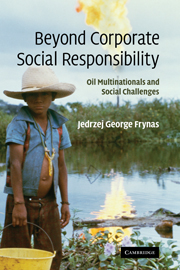Book contents
- Frontmatter
- Contents
- List of figures
- List of tables
- Chapter 1 Introduction
- Chapter 2 The logic of CSR strategies
- Chapter 3 The context of CSR
- Chapter 4 The environmental challenge
- Chapter 5 The development challenge
- Chapter 6 The governance challenge
- Chapter 7 Conclusions and recommendations
- Glossary
- References
- Index
Chapter 4 - The environmental challenge
Published online by Cambridge University Press: 27 July 2009
- Frontmatter
- Contents
- List of figures
- List of tables
- Chapter 1 Introduction
- Chapter 2 The logic of CSR strategies
- Chapter 3 The context of CSR
- Chapter 4 The environmental challenge
- Chapter 5 The development challenge
- Chapter 6 The governance challenge
- Chapter 7 Conclusions and recommendations
- Glossary
- References
- Index
Summary
By looking at CSR's prospects and limitations in the oil and gas sector this chapter investigates the extent to which CSR can address environmental challenges. As indicated in Chapter 3, the environmental challenge of the oil and gas industry lies in the fact that the nature of oil operations involves many potential negative environmental effects. Public awareness of the environmental impact of oil operations was heightened by major environmental disasters in the past, including oil tanker accidents such as the Exxon Valdez spill off Alaska in 1989 and ‘well blow-outs’, for example, when Mexico's Ixtoc 1 oil well blew out and released an estimated 3 million barrels of oil into the Gulf of Mexico in 1979.
As mentioned in Chapter 3, oil and gas operations pose a threat to the environment at each stage of the process – construction, exploration, production, transportation and refining. During the construction of oil infrastructure and oil company facilities, lorries and construction teams may cause dust and waste may be created. During the exploration for oil and gas, environmental threats include, among others, clearance of land (which can lead to a long-lasting or permanent loss of vegetation) and drilling activities (which can lead to the release of drilling fluids). Oil production activities can have an adverse impact on the environment through damage from leaking pipelines or atmospheric emissions from the flaring of gas, a by-product of oil production.
- Type
- Chapter
- Information
- Beyond Corporate Social ResponsibilityOil Multinationals and Social Challenges, pp. 64 - 101Publisher: Cambridge University PressPrint publication year: 2009



